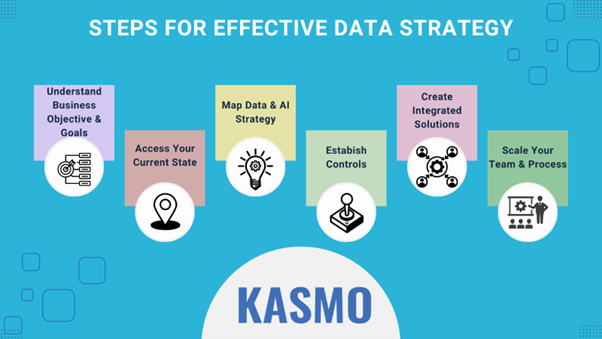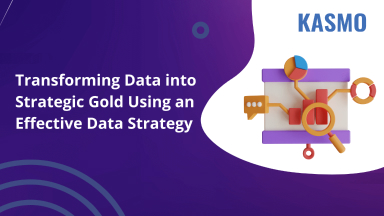If there is a business, then there should be data. All types of businesses collect their own data today. But the data alone is not sufficient for businesses to make informed decisions. They need a data strategy for managing and analyzing the data. Without an effective data strategy organization should face various challenges such as data breaches and inefficient workflows which may hamper their business performance. To overcome these challenges effective strategy is essential.

What is Data Strategy?
It is a strategic plan made using various technologies and procedures to manage and analyze business data and optimize business decisions. For organizations to have a long-term vision, strategy is important for governing, storing, and sharing data. Data lake is one such storage unit which helps organizations to achieve it.Challenges Faced by Organizations Without an Effective Data Strategy:
- Data Silos: Businesses have different departments working on different set of data. These data are collected and managed independently, leading to data silos. As a result, organizations cannot view all their information in one location.
- Inaccurate Decision-Making: Sometimes Data silos leads to incomplete data collection where organizations do not have the complete information for decision making.
- Security Risks: Lack of data protection strategy leads to data breaches, exposing sensitive information to unauthorized access.
- Missed Opportunities: Organizations may miss valuable opportunities to extract insights and drive innovation due to data silos. Competitors with an effective strategy may leverage data and outperform in the market.
- Compliance Issues: In industries with strict regulations, lack of a data protection strategy may result in non-compliance with data protection laws. This can lead to fines, damage to the reputation of the company, and might lose customer trust.
- Inefficient Operations: Processing of data may be inefficient, resulting in waste of time and resources. This can hinder the overall operational efficiency and competitiveness of businesses.
- Poor Customer Experience: Organizations may struggle to understand customer needs and preferences. This can result in poor customer experience and the loss of customer loyalty.
- Difficulty in Scaling: As organizations grow, managing data becomes more complex. Scaling operations and adapting to increased data volumes can be challenging.
Benefits of a Resilient Data Strategy for Business
1. Enhanced Operational Efficiency and Productivity:
Streamlining business processes is the primary benefit of effective strategies. It addresses issues related to slow and inefficient workflows with near real-time report generation. It helps organizations to reduce their repetitive manual operations, reduce human errors and free up resources by data integration and automating data pipelines. As a result, more responsive operational environment can be created.2. Data Governance:
Data governance strategy plays an important role in ensuring data privacy, integrity, and quality. It’s frameworks such as GDPR, CCPA, and HIPPA can reduce risks associated with data and strengthen their capacity to derive accurate insights.3. Deeper Business Understanding:
Businesses often struggle to understand critical aspects such as customer behaviour, supply chain dynamics, and competitive landscapes. But effective data strategies facilitate informed decision-making and strategic planning.4. Clarity on Business Needs:
Descriptive analytics, a component of data strategy, helps businesses gain clarity of their current needs. This helps organizations understand where they stand at present and what changes are required in future.5. Goal Identification with Predictive Analytics:
Predictive analytics, an integral parts of data strategy, assists in identifying future goals. By leveraging historical data and modelling techniques, businesses can determine future trends. This helps businesses adapt to changing market conditions, technological advancements, and evolving customer preferences, ensuring long-term relevance and competitiveness.6. Data Quality:
Inefficient data movement across various departments can hinder performance. A well-defined data strategy ensures smooth data flow, prevents data quality issues and enables information sharing among different segments of the organization.7.Cost Optimization:
Effective data management minimizes the costs associated with data storage and maintenance. Overall visibility of Business with accurate reports helps organizations in decision making process associated with resource allocation. This indirectly optimizes the budget.
Kasmo Differentiators for Businesses
Kasmo’s accelerators and agile frameworks reduce the time between data strategy and ROI. We deliver future-proof solution accelerators quickly, enhancing quality and minimizing time to market for organizations. With 60+ certified consultants, we help you build a reusable data strategy framework. With advanced data scientists having 10+ certifications, we help your organization reach greater heights. Today, A well-defined strategy is the key to unlock the true potential of data. By addressing challenges such as data silos, inefficient decision-making, security concerns, and missed opportunities, organizations can improve their decision-making process. The components, benefits, and goals outlined above provide a roadmap for businesses, ensuring they stay competitive in a data-driven era. Kasmo in partnership with snowflake and AWS helps businesses to develop and implement a robust strategy.Connect with our experts to know more about our data strategy services.

